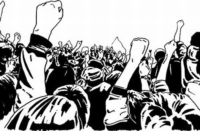To my eternal embarrassment, it’s only in very recent times that I realised that, in the scale of human existence, capitalism was actually a very young system of living—or existing. For some reason, I never thought to see it in terms of age.
It would seem obvious now, but it would appear that my concentration was on the destructive force of capitalism and how it destroys people’s lives. Also, trying to grapple with a knowledge of Marxist theory and practice, trying to map out a new way forward, in my own thinking at least, seems to have hidden the noticing of the relatively young age of capitalism, or its age at all.
Now, it’s not a critical piece of information, but it dispels the notion that is, almost certainly, held by the vast majority of people: that capitalism has always been there; and this in turn feeds the notion that it always will be there; therefore struggle against it is futile. And the idea is promoted that there is no alternative.
The point is that “obvious” things, to those who know, are not always that obvious to everyone else.
Too often activists and communists, trying to create change, miss this. Indeed we often become frustrated by the lack of basic understanding on the part of the wider population of how they are being exploited, and why they will not listen to or act on what we are saying.
Armies of political scientists, psychologists and many other “gurus,” right across the political spectrum, have written zillions of words about every conceivable angle on this topic. Nothing I say here is going to be revealing or provide the breakthrough strategy for starting a revolution, but it might result in getting our message heard better.
There are ways of saying or explaining things about the reality of how the world works that can inform people in very simple ways. And the case in point, about the age of capitalism, is one such. When you say to people, as I now want to do, that capitalism is only approximately three hundred years old, they look at you in a funny way, and it surprises them, because they assumed it had always been there.
Then when you mention that before capitalism there was feudalism, and before that slavery, and so on, they begin to get curious. They have heard of slavery, but mostly not of feudalism. The concept of the duration of any of these epochs never really features. However, the question of what is feudalism, or how did it work, begins to be asked. Why is it, or was it, different from capitalism?
The point of all of this is that it demonstrates to people that, contrary to what they believed, change is possible, and actually happened. You could further point out that in fact humans create that very change; but there is always the danger of “eyes glazing over” from the over-exuberance of the activist trying to get everything in life explained in twenty minutes or so.
It’s easy to forget that people have work they must go to, bills to be paid, shopping to be done, and children to be minded. And that’s often another factor that we overlook too: that people are in fact trapped in the cycle of a capitalist-imposed life, which includes the element of fear of the very system that oppresses them. That’s going to be a tough one to circumvent.
Another interesting thing that can be done is, when people talk about their work, as they do, to point out or to ask them if they know that the first two (or three) days of their work pays all their wages and their employer’s expenses for the entire week, and that the next three days are virtually clear profit for the employer.
Many are astounded at this simple fact, and never thought of it in those terms. They often know they were being exploited but not the mechanics of it. Now, it is tempting to tell them that they are in fact working the rest of the week for nothing and go into the virtues of Marx’s surplus value; but enough is enough. The seed has been planted by the “two-day revelation theory”; so let’s see where it goes.
Not very scientific, but it does make people think. What will they do with this new knowledge? Well, that’s a whole other debate.
“I own my own house.” Do you? The reality is that you do not, nor will you for at least twenty-five years, if not thirty-five. The bank, mortgage company or vulture fund owns it. You only have the use of it and its upkeep until you make your final payment. If you default, you’re out.
The psychological lure of the “property ladder” is in fact “snakes and ladders.” As long as you pay the rent you have a house, but you don’t really have a home yet—not to mention the stress of two parents working to make the mortgage repayments alone. This too can be developed into the public-housing concept, lifetime rent according to means, and so on. Do we explain this public housing concept clearly enough to the wider populace? What are and should be the nuts and bolts of it for people?
There are, without doubt, many simple ways to get people to think about their situation without appearing like a know-all or making people feel inadequate. With justification, we would be more inclined to infer that people need to learn about, say, socialism, Marxism-Leninism, or even communism, when in fact it might be tactically smarter to say, “Well, let’s study capitalism and its culture first.” It’s less alien to them, and they are living it.
Just on the issue of socialism or communism: often these words inspire loathing and fear, fuelled by the black propaganda of capitalism and imperialism, through schooling, church, and media. Even those who are active in these areas have been driven to not openly show their true political leanings, mainly because of rampant McCarthyism or the like. There has been a very successful campaign, certainly in Ireland, to drive socialism, and more so communism, into the shadows. That’s a serious indictment. We need to break that, if we can.
You constantly hear the refrain “Ah sure, socialism doesn’t work.” Yes, it does, and you can point out the reality and acceptability of what has been called “corporate socialism.” Government grants, cheap bank loans and tax reliefs are all part of the socialism-for-business cycle. There are so many angles from which we could come at this that I think it deserves lots of consideration. There are many other iterations of socialism (except social democracy) that could also be pointed to that fly under the radar unnoticed. Again, not many people would have heard the term “corporate socialism,” or how it actually affects their lives. Could that too be developed into basic learning pamphlets?
So what is the point of this article for activists, in general? Is anything being said that hasn’t been said a thousand times before? Almost certainly not.
But it might be useful to remind ourselves that we can become blinded by what we know and often frustrated that people don’t get it. There are always new ideas and ways of getting our message out. We also know that we need people and communities on our side. It is vital that we talk to people at their level but without diluting what we know is necessary for change and a new, radical revolutionary society. For this we probably need to constantly look at innovative ways to “myth-bust” and educate both ourselves and the wider public.
Capitalism has done a good job on the worldwide population of hiding its reality. It has fooled people into believing that there is no other way. People are fooled by the bourgeois parliamentary representative “democracy” system. Capitalist cultural influences are inculcated into the very DNA of people. It is a very powerful force. But clearly not unbreakable.
Another topic that the great majority of people think is “natural” and “normal” is profit. Sadly, to most people it is sacred, or at least all right—no harm in it. He or she is a “great entrepreneur.” How do we change that narrative? Do we point out the basic fact, and often enough, that without workers there would be no “entrepreneurs”? How can we point out in very basic language how and why profit is not sacred at all and even from where it is derived? Surely this can open up a discussion on inequality and exploitation, at the very least?
Maybe if this article does anything to start a conversation on ideas of how to be innovative, and maybe build a very basic activists’ template for simple explanations to the wider population, then that might be progress.
So now, calling on all comrades to think about contributing, developing and expanding this type of potentially innovative activism. And strive to keep it basic, because we need our communities with us, not in awe of us or intimidated by what we say.






